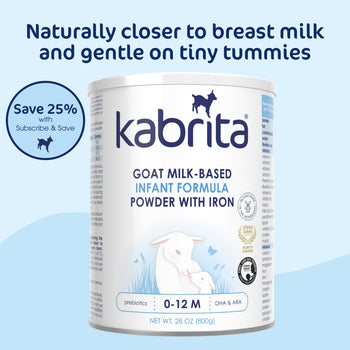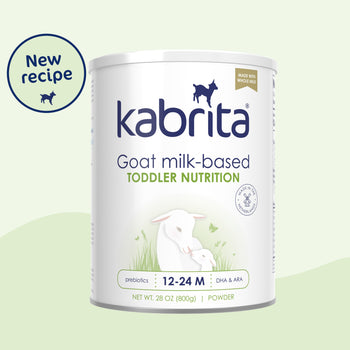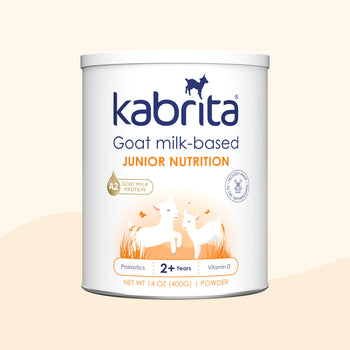Sensitive Infant Formula: Why Goat Milk is the Best Natural Option
By Jessica D'Argenio Waller, MS, CNS, LDN
In your baby's first few months, you're still playing interpreter—from reading their hunger cues to deciphering their cries to trying to tell if they're ready for a nap. Which is why it can be tricky to understand if your baby is having a hard time tolerating their current formula. Crying, reflux and spitting up can be common in infants since their digestive system is still developing. So how can you tell if your baby is sensitive to the formula they're using? In some cases, when symptoms of digestive discomfort persist for prolonged periods, it may mean that your baby could benefit from switching to a sensitive or gentle infant formula. We'll dive into an overview of infant formulas for sensitive stomachs, how to tell if your baby needs sensitive or gentle formula, and what to know about choosing an appropriate infant formula for your growing little one.
Table of Contents
What is sensitive infant formula?
How to know if your baby needs a gentle formula
Best infant formula for sensitive stomachs
FAQs on infant formulas for sensitive stomachs
What is sensitive infant formula?
You might see infant formulas labeled "sensitive" or "gentle" on store shelves. They both contain modified ingredients designed to be easier on a baby's developing digestive system than traditional formulas. While most traditional infant formulas are made from a cow's milk base, cow's milk contains firmer proteins, which may prove troublesome for some babies to digest.1
A sensitive infant formula typically has lower levels of the milk sugar lactose. However, most babies have no issue digesting lactose—it's the same molecule as in breast milk. The proteins in cow's milk formula tend to be the issue when it comes to digestibility.
Gentle infant formula, on the other hand, features either naturally smaller or partially broken-down proteins (you might see "partially hydrolyzed" on the label).
Goat milk infant formula is not classified as a ‘sensitive' or 'gentle' formula, yet it naturally has properties that can make it easier to digest for some infants. Goat milk forms softer, smaller curds2 in the stomach compared to cow's milk, which naturally makes it easier to digest than cow's milk-based infant formulas with large proteins, supporting less gas and fussiness.3
Extensively hydrolyzed formulas, sometimes called hypoallergenic or HA formulas, have proteins that are broken down even more completely and are typically recommended for babies with more significant protein sensitivities or diagnosed CMPA.
In some cases, a soy-based formula may be necessary, especially for infants with a condition called galactosemia, where a baby cannot digest galactose, a byproduct of the milk sugar, lactose—even the lactose in breast milk.
Understanding formula sensitivity in infants
While CMPA is rare—it's thought to affect up to 3% of infants—many more babies may experience sensitivity or intolerance to cow's milk-based formulas, which differs from a true allergy.
"Some babies have trouble digesting cow milk protein," says Ari Brown, MD, FAAP. "While very few (3%) have a true cow milk allergy, the cow protein component called casein produces large and hard curds during the digestive process, making it more difficult to pass, leading to gas, bloating, discomfort, and sometimes constipation or diarrhea."
If an infant is diagnosed with CMPA, goat milk infant formulas are not recommended, due to the potential for protein cross-reactivity.4 In this case, your baby's pediatrician may recommend an extensively hydrolyzed or elemental amino-acid based formula. Most kids will outgrow CMPA by 1 year of age, and for those who don't, the majority will do so by 3 years of age.
For babies who are not diagnosed with CMPA, yet seem to experience significant digestive discomfort timed to formula feedings—think: gas, a tight stomach, crying after eating—goat milk infant formula can be a great alternative.
How to know if your baby needs a gentle formula
"All babies under 6 months of age do their fair share of crying, spitting up, and passing gas," says Dr. Brown, making it hard to know what's normal and what's not. "But babies who spend several hours a day crying and have extreme difficulty settling, and/or who are constantly spitting up, and/or have constipation, and/or who have eczema should be evaluated by their pediatrician to discuss making a formula switch," she explains.
Signs your baby might be sensitive to formula: Symptoms to look out for
How to know if a baby needs a gentle formula? Keep in mind that while occasional fussiness is normal for infants, especially those under the age of 6 months, consistent and ongoing digestive symptoms6 may mean it's worth having a conversation with your pediatrician about switching to a gentle formula. Here are key signs to watch for:
Frequent digestive issues
-
Excessive gas
-
Bloating or hardened stomach
-
Difficulty passing bowel movements
-
More spit-up than usual
-
Arching back during or after feeding (this may also be related to acid reflux)
Changes in stool patterns
-
Very loose or watery stools
-
Unusually hard stools
-
Stools with mucus or blood
-
More than 3 to 4 days between bowel movements
-
Straining during bowel movements
Skin and respiratory symptoms
-
Frequent, unexplained rashes or eczema
-
Congestion or wheezing
Excessive crying
-
Crying for more than 3 hours per day
-
Crying happens especially after feedings
-
Pulling legs up to stomach while crying
-
Difficulty being consoled or trouble sleeping
If you're wondering how to tell if a baby is sensitive to formula, remember: If your baby is dealing with several of these symptoms consistently, especially after feedings, bring it up with your pediatrician. They can help determine if a sensitive tummy formula or gentle formula might be beneficial for your little one.
What to know about PURPLE crying
It's important to note that excessive crying can be typical in the newborn phase—and it may not signal the need for a formula switch. The period of PURPLE crying is a normal stage of infant development in which babies cry for as many as 5 hours a day, reaching a peak between weeks 6 and 8, and potentially lasting until months 3 to 5. This type of crying (you may also have heard it called colic) resists soothing, seems unexpected and traditionally sets in during the evening hours, but it does eventually end.
The term "purple" is an acronym for what some parents of newborns may expect during this phase.
P – Peak of crying: Crying usually peaks around two months of age
U – Unexpected: Crying comes and goes without reason
R – Resists soothing: Baby may not stop crying no matter what soothing techniques are offered
P – Pain-like face: Baby may appear to be in pain, even when they are not
L – Long-lasting: Crying can last for several hours per day, as many as 5
E – Evening: Crying commonly starts in the late afternoon or evening
The causes of PURPLE crying are unknown, but experts generally believe it means that an infant is highly sensitive to stimulation and isn't yet able to self-soothe or effectively regulate their nervous system. In most cases, as long as an infant is otherwise healthy, feeding well and developing as expected, there's no cause for concern, but be sure to bring it up with your pediatrician just in case.
Best infant formula for sensitive stomachs: Goat-based infant formula
If your little one is not tolerating traditional cow milk formula, it’s worth considering goat milk-based infant formula. "Goat milk protein is naturally more similar to human milk protein, and as a result, babies have fewer issues with discomfort," says Dr. Brown. She explains that goat milk protein naturally contains more Beta casein (typically found in breastmilk) and less Alpha-S1 casein,7 which is a key component of cow milk protein. "It's this combination that makes goat milk protein more easily digested," she says, and gentler on tiny tummies.
Goat milk-based infant formula has been a popular parent choice around the globe for decades–for good reason, explains Dr. Brown. "It contains all the nutrients, vitamins, and minerals that babies need to grow and thrive with the benefit of being naturally gentler and overall, better tolerated by babies than cow-milk based products."
The only cases in which a goat milk infant formula isn't recommended is when an infant is diagnosed with CMPA, due to similarity in the milk proteins.8
Why choose goat milk infant formula for babies with sensitive stomachs?
Beyond the smaller curds and more easily digestible proteins, goat milk naturally contains more important prebiotics, called oligosaccharides, as compared to cow’s milk.9 "This bioactive ingredient helps with both digestion and immune function and it is a key nutrient found in human milk. Kabrita adds additional galacto-oligosaccharides (GOS) to maximize the benefits for the baby," Dr. Brown says.
How to transition to a goat milk-based infant formula?
"There really is not any formal transition here," advises Dr. Brown. "If a baby has trouble tolerating a particular product, it’s best to stop using it and move to a different product completely. I don’t suggest gradually phasing it into a baby’s diet. If they are having trouble, they should stop eating that product and assess for improvement on the new formula."
FAQs on infant formulas for sensitive stomachs
Is gentle formula good for babies?
Yes, gentle infant formula tends to have partially broken-down or hydrolyzed proteins to make the cow's milk proteins smaller and easier to digest for infants' developing digestive systems. A goat-milk based infant formula is a naturally gentle option that's more similar to breast milk than cow-milk based formulas,7 and can be better tolerated by some babies. Speak to your child's pediatrician about what type of formula might be best for your infant.
When should I switch my baby to sensitive formula?
It's always best to chat with your child's pediatrician before making any big dietary changes like switching formula, as your doctor can help determine if your baby's symptoms warrant a switch—and can recommend the best option for your little one. Sensitive formulas tend to have lower lactose, but lactose is molecularly similar across cow milk, goat milk and breast milk, and it is extremely rare that an infant would have a significant problem digesting and absorbing lactose, explains AAP.
However, if you notice that your baby is having more crying, fussiness, digestive discomfort and eczema on their current formula, your doctor may suggest transitioning to a gentle infant formula or an alternative like a goat-milk based formula, and the switch can happen right away.
What is the most gentle formula for babies?
What is the best gentle formula for you depends on your baby's specific digestive needs. However, several types of formulas are known for being easier to digest, including infant formulas labeled "gentle", "gentlease formula" or "comfort". These formulas are similar to traditional formula but are designed for babies with mild digestive sensitivities and feature reduced protein complexity: Proteins are broken down into smaller, more easily digestible pieces.
As Dr. Brown notes, "Some studies show goat milk-based infant formula is more tolerated or gentler than cow milk-based infant formula." Benefits of goat milk infant formula include:
-
Smaller, softer protein curds
-
Lower levels of difficult-to-digest proteins
-
Naturally closer molecular structure to human breast milk
It's important to note that no single formula works best for every baby, as digestive needs vary widely. Baby sensitive to formula? If you've got questions about switching to a gentle formula, check in with your child's pediatrician to talk through the options.
What are signs of formula intolerance in babies?
You might see physical and behavioral signs in your baby that could mean they're having trouble digesting their current formula. Keep on the lookout for the following symptoms as signs of possible formula intolerance, and bring up any concerns with your child's pediatrician.
Digestive symptoms:
-
Excessive gas, bloating, and stomach discomfort
-
Frequent, forceful spit-up or vomiting
-
Chronic constipation or diarrhea
-
Unusual stool color or consistency (mucousy or watery)
Behavioral signs:
-
Intense crying after feedings
-
Difficulty settling or sleeping
Skin and respiratory indicators:
-
Eczema, itchy rash or swelling
-
Nasal congestion or wheezing
Can infant formula for sensitive stomachs cause more gas?
If you're in the process of transitioning to a gentle infant formula, you might notice a few days of digestive changes, like more gas or spitting up, as your baby's digestive system adjusts to the new formula. Some babies may react to different levels of protein digestion, but these changes should be temporary. If your baby still seems uncomfortable after feedings on their new formula, is crying excessively or having consistent issues with bowel movements (like constipation or diarrhea), talk to your baby's pediatrician, as they can recommend a formula option that may be better tolerated.
How to tell if a newborn needs a sensitive formula?
Sensitive formulas tend to have lower levels of lactose, but it's very rare that a baby will have a hard time digesting lactose. What's more common is that they could be having trouble digesting cow milk proteins, and could benefit instead from a gentle infant formula, which features partially broken-down proteins. But the best way to know if your newborn needs a different formula is to chat through any signs and symptoms you're seeing with your pediatrician. They can help you assess any symptoms and talk you through the best next steps, which may include trying out a gentle formula or a gentle alternative, like a goat milk-based infant formula.
Finding the right infant formula for your baby
Sometimes, finding the just-right formula for your infant is a process of trial and error. If you're noticing signs that your baby is having trouble digesting a traditional cow's-milk based infant formula, it could be worth switching to a gentle infant formula, or a gentle option like a goat milk-based infant formula. Ask your pediatrician for help navigating options on your feeding journey for the best infant formula for sensitive stomachs, as your doctor can take an account of your baby's unique needs—and help you find the right fit.
Citations
-
Maathuis A, et al. Protein digestion and quality of goat and cow milk infant formula and human milk under simulated infant conditions. J Pediatr Gastroenterol Nutr. 2017;65(6):661-666.
-
Ceballos LS, et al. Composition of goat and cow milk produced under similar conditions and analyzed by identical methodology. J Food Composition Analysis. 2009;22(4):322-329.
-
Jakobsson I. Cow’s milk proteins cause infantile colic in breast-fed infants: a double-blind crossover study. Pediatrics. 1983;71(2):268-271.
-
Mansor M, Al-Obaidi JR, Ismail IH, Abidin MA, Zakaria AF, Lau BY, Mohsin AZ, Sukor R, Selamat J, Mahmud NK, Jambari NN. Cross-reactivity analysis of milk proteins from different goat breeds with cow’s milk allergens using a proteomic approach. Molecular Immunology. 2023 Mar 1;155:44-57.
-
Kerner JA Jr. Formula allergy and intolerance. Gastroenterol Clin North Am. 1995;24(1):1-25.
-
Bajerova K, Salvatore S, Dupont C, et al. The Cow's Milk-Related Symptom Score (CoMiSS™): A Useful Awareness Tool. Nutrients. 2022;14(10):2059. Published 2022 May 14. doi:10.3390/nu14102059
-
Park YW, Haenlein GFW. Handbook of milk of non-bovine mammals. 2nd ed. 2017, Ames, Iowa: Blackwell Pub.
-
Mansor M, Al-Obaidi JR, Ismail IH, Abidin MA, Zakaria AF, Lau BY, Mohsin AZ, Sukor R, Selamat J, Mahmud NK, Jambari NN. Cross-reactivity analysis of milk proteins from different goat breeds with cow’s milk allergens using a proteomic approach. Molecular Immunology. 2023 Mar 1;155:44-57.
- Martinez-Ferez A, et al. Goats’ milk as a natural source of lactose-derived oligosaccharides: isolation by membrane technology. Int Dairy J. 2006;16(2):173-181.



